 On March 6, 2020, not long before the world changed overnight and (among other things) we began to work remotely, I heard Dan Abrams talk about his new book “John Adams Under Fire” on “Morning Joe.” Abrams recounted how his book uses a 1770 trial transcript from legal proceedings after the Boston Massacre and referred to the transcript as an “under-appreciated document.” Willie Geist, the always-pleasant host, asked him (twice!) in astonishment, “where do you get these documents?!”
On March 6, 2020, not long before the world changed overnight and (among other things) we began to work remotely, I heard Dan Abrams talk about his new book “John Adams Under Fire” on “Morning Joe.” Abrams recounted how his book uses a 1770 trial transcript from legal proceedings after the Boston Massacre and referred to the transcript as an “under-appreciated document.” Willie Geist, the always-pleasant host, asked him (twice!) in astonishment, “where do you get these documents?!”
I remember that I yelled at the television (yes, I do that all the time), “IN AN ARCHIVE!!!” And I wondered why Geist asked that question because of course (right?) a reporter (or a writer, historian, biographer…) knows to check archives for material relevant to their work. Still, even if you know to check archives, it isn’t always easy to find what you want, or to be lucky enough, or have time enough, to make a serendipitous discovery.
In the Amherst College Archives & Special Collections, we obsess (in the nicest way) about how to make things easier to find, and how to bring them to the public’s attention — how to lead a horse (you) to water (documents). Given a limited staff, there’s only so much we can do, but we always think about ways to improve.
This blog serves that purpose. And in today’s post I want bring the Archives and Special Collections to you and share an “under-appreciated” letter.
The letter came to light as part of our ongoing survey of our holdings. One of the items on my to-do list was a scrapbook album belonging to Cornelius H. Patton, Class of 1883. I had accessioned this volume into our collection about 15 years ago, but its importance didn’t sink in until the survey allowed me to look at it closely. I expected a scrapbook of ephemera from Patton’s college years; instead, it’s a genealogical/personal scrapbook, containing both family items from three or four generations as well as items important and specific to Cornelius (including a little of the Amherst ephemera I had anticipated). It even contains documentation of how Patton came to be interested in William Wordsworth, thus explaining the origin of a collection now at Amherst College.
Among this material there were items relating to Cornelius’s father’s experience in the Civil War. And there was that astonishing letter I mentioned above.

The letter is from William Weston Patton (1821-1889) to his wife, Mary Boardman Smith. Patton writes from Richmond, Virginia on April 12, 1865, ten days after Robert E. Lee evacuated his troops from the city. Patton, a confirmed abolitionist, describes the city after Confederate troops left it, and shares his joy about the Union’s victory. Here are photographs of his letter and my transcription (please pardon the quality of the photographs, taken quickly before we evacuated our offices in mid-March).
[Note that the first line, beginning with “N.B.” is in the hand of son Cornelius H. Patton].
N.B. Richmond was evacuated by Lee April 2-3
Richmond, Va. April 12th 1865.
My Dear Wife,
You notice a new style of paper, such as I have never before used for my letters, sermons, or other purposes. I picked it up amid a heap of waste Confederate material in the Custom House yesterday, and thought I would put it to good use. The lettering at the head may help you to realize (as I can scarcely do myself) where I am. I write in a room in the Powhattan House near the public square. We reached Richmond yesterday at noon. I wrote a hasty line on the [river] and sent it back by the boat. I took dinner at a restaurant kept by a colored man in the office of what was a large hotel, which is occupied now by soldiers & families. During the P.M. I walked the city till completely tired out, having first seen Asst Secy. of War Dana, and persuaded him to telegraph an order to City Point for Dr. Davies to come up, who will reach here today noon.
Richmond in its best portions is a very pleasant city, on elevated ground, with good streets, tasteful but not very costly dwellings, some shrubbery, and a fine public square with admirable statuary.


Confederate documents cover the ground and line the ditches around the square. The business part of the city is burnt (equivalent to S. Water & Lake Sts in Chicago) and presents a sad sight. The Negroes are here in immense numbers and are overjoyed at the state of things. Negro troops are on every hand, and are greatly admired by the black inhabitants. The poor whites are very acquiescent in the change of rulers, but the upper class is sour and sullen, gloomy and subjugated.
I have picked up sundry very amusing letters on the streets written to Rebel soldiers by their sisters and sweethearts–genuine articles. I shall try today to see what can be found for the [N.W.?] Fair. Offices have been opened in various quarters of the city to supply food to the poor. Large numbers are taking the oath of allegiance. I went and looked at the outside of Libby Prison yesterday — an old fashioned brick building of three low stories, now crowded with Rebels, who were laughing and joking from the windows where our men were shot if they showed themselves!
My plans are indefinite as yet, as to my stay here. I am full of praise to God as I walk about, and sing the John Brown song perpetually.
Kiss the baby for me. Love to all the big and the little.
Your loving husband
Wm. W. Patton
The title of this post, “Red Hot Abolitionist,” comes from another letter in the scrapbook, one to William W. Patton from his brother Ludlow (standing at back in family photograph above). Ludlow refers approvingly to a mutual acquaintance (probably Rev. Charles H.A. Bulkley) as a “red hot abolitionist,” but there’s no doubt that William W. Patton was also fiery on the topic, as his “John Brown” lyrics prove. He preached and wrote about slavery and abolitionism extensively, as I learned when researching Patton for this post, an exercise that led to multiple websites. Rather than rewriting what others have covered before, here are links to some of the sites with information about Patton:


- Memorial sermon for William Weston Patton, written by his son Cornelius, with biographical details and the text of W. W. Patton’s lyrics for the John Brown song : https://archive.org/details/honourthyfathers00patt
- Patton on his lyrics: http://www.gutenberg.org/files/57300/57300-h/57300-h.htm
- Patton’s lyrics at Howard University: https://dh.howard.edu/og_poetry/29/
- Hear the John Brown song with Patton’s lyrics at Youtube: https://www.youtube.com/watch?v=LmvOHQ4zgm0 and here, with a verse added and another slightly altered: https://www.youtube.com/watch?v=bSSn3NddwFQ
- Diaries of W. W. Patton at the Connecticut Historical Society: https://chs.org/2010/02/rev-william-weston-patton/
- “President Lincoln and the Chicago memorial of emancipation” (1887), Patton recollecting a September 1862 visit to President Lincoln to urge him to emancipate the slaves:
- Lincoln’s “Reply to Emancipation Memorial Presented by Chicago Christians of All Denominations”: https://quod.lib.umich.edu/l/lincoln/lincoln5/1:933?rgn=div1;view=fulltext
- The William Weston Patton, 1836-1918 Papers in the Union Theological Seminary Archives, Columbia University in the City of New York: https://library.columbia.edu/content/dam/libraryweb/locations/burke/fa/uts/ldpd_11918961.pdf
- Southern University of Law Professor Douglas W. Lind’s extensive bibliography of Patton materials, here: https://law.siu.edu/our-people/faculty/law-faculty/lind-publication.html and here: https://law.siu.edu/_common/documents/publications/Lind/lind-unbound-2016.pdf, including information about Patton’s role as the fifth president of Howard University (1877-1889).
- Patton’s inaugural address at Howard University: https://archive.org/details/inauguraladdress01patt
- An early (1927) history of Howard University, including Patton’s role in obtaining federal funding during his time as president: “A History of the Federal Appropriation of Howard University 1867-1926”: https://dh.howard.edu/cgi/viewcontent.cgi?article=1037&context=hush
- Lane memorial: digitized photocopy of “Obituary Addresses on the Occasion of the Funeral of Professor Wiley Lane.” Wiley Lane, Amherst College Class of 1879, prepped at Howard University and returned there to teach until his early death in 1885. Patton and George F. Hoar were among the speakers at his funeral. Original sermon publication is in the Amherst College Archives and Special Collections (Archives & Special Collections File / BX7260 .L2 1885). Includes an address by Frederick Douglass.
- William Weston Patton at Wikipedia: https://en.wikipedia.org/wiki/William_Weston_Patton
Finally, here are more images (poorly photographed — apologies) from the album. Click on any image to enter the gallery.

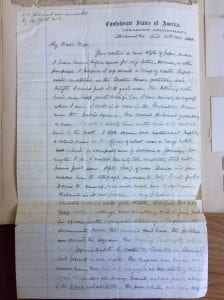
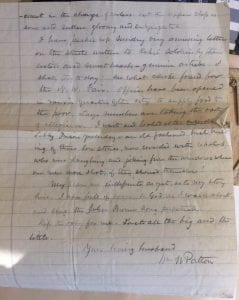
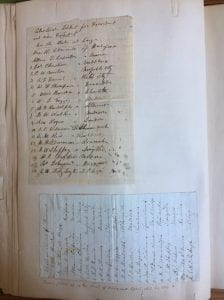
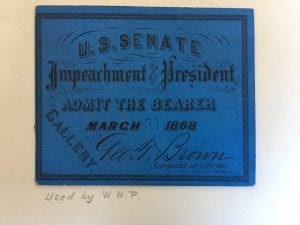
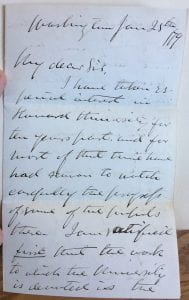
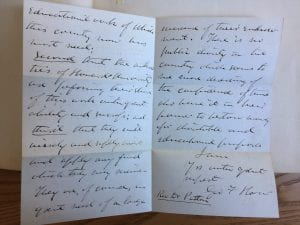
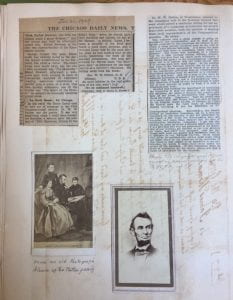
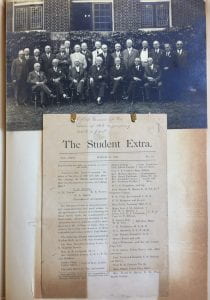
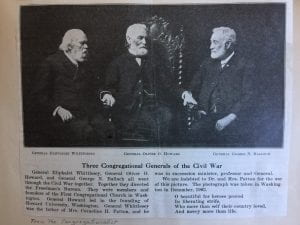
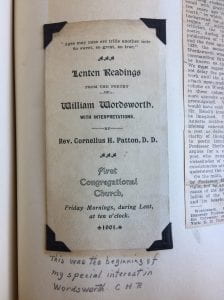
Thank you so much for this wonderful post! William Weston Patton was my great great grandfather (my mother’s father’s father’s father…) and I have been researching him for awhile, with a gap…. I just resumed research this week on the project… This post is just LOVELY to run across; the letter is wonderful; the photograph is fantastic (we have a photo of Wm Weston from around this period, but the other family members in THIS photo may be in other photos we have of as yet unidentified family members!). I loved the post and will treasure it. I would be interested to hear more about the archive and what it holds, and I will put it on the list of archives to visit re my Patton ancestors. All the Patton brothers went to Amherst. I imagine there is lots of interest there. Thank you!
@mrdakin
Thanks for sharing this post and all the content and references to Rev. William Weston Patton. You’ve done a lot of research and I’m grateful Morning Joe inspired it! Having all the materials and links you’ve researched in one place is terrific.
And I just noted a comment to this post from several years ago from Allison Harvey, a relative I knew not of until this very moment!
Many Thanks!